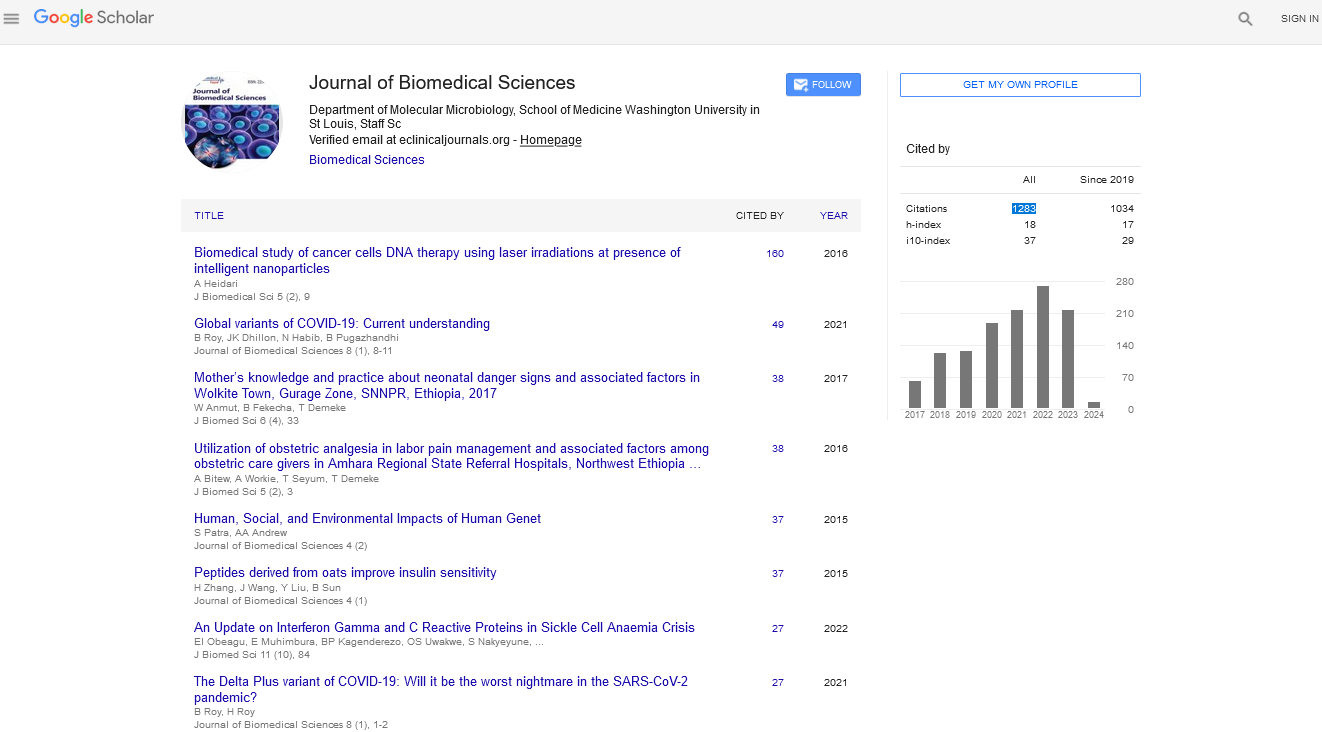James Kelvin*
Department of Biomedical Pharmacy Services, University of Glasgow, Glasgow State, UK
- *Corresponding Author:
- James Kelvin
Department of Biomedical Pharmacy Services Science,
University of Glasgow,
Glasgow State,
UK,
Email: kelvinjam@gmail.com
Received Date: August 23, 2021;Accepted Date: September 06, 2021;Published Date: September 13, 2021
Citation: Kelvin J (2021) Engine Room of Modern Biomedical Science. J Biomed Sci Vol. 10 No. 5: 62.
Biomedical Science is the engine room of modern medicine. All samples taken by a Biomedical Scientist, without biomedical scientists, doctors wouldn't be ready to diagnose diseases properly or treat patients effectively. Today’s Biomedical Scientists is probably going to be found in modern, bright surroundings using the newest state of the art equipment.
In medical microbiology, we can study about the microorganisms such as bacteria, fungi and parasites which cause disease and we can identify these organisms and establish the antibiotic treatment required to kill them therefore stopping the disease.
Keywords
Hematology; Leukemia; Cytology; Virology;
Cellular material
Description
Diagnosis of a disease includes meningitis, tuberculosis and
food poising. In biomedical analyses blood and other biological
materials to assist the diagnosis of disease e.g diabetes. They
also perform toxicological studies, test kidney and liver functions
and help to watch therapies. Some of the diseases diagnosed in
hematology are leukemia, malaria and anemia.
In histology tissue samples are studied microscopically to
determine the explanation for illness. Tissue could also be taken
during surgery or at post mortem. Diseases like cancer are
diagnosed by abnormal features in tissue cells. Cytology is the
best known for its work screening cervical smears, but it also
provides a non-gynecological service. Like Histology, specialized
techniques are required to prepare and study samples of cellular
material.
Virology is that the study of viruses and therefore the disease
caused by them like German measles, HIV and Chickenpox. It is
also involved in the monitoring the effects of vaccines.
Biomedical Scientists in Immunology affect the condition of
the body system and its role in infectious diseases, allergies,
tumor growth, tissue grafts and organ transplantation. Their
work is especially important within the monitoring and
treatment of diseases. Modern pathology and biomedical
laboratory work involves complex and diverse investigations
requiring an in-depth knowledge domain of anatomy, physiology
and pathology. Since life science is continually changing and is
such a dynamic profession.
Health care is a part of traditional medicine with increasing
potential exploitation in clinical medicine. Although there are
still many issue regarding their incorporation in clinical practice,
standardization and quality control, human clinical,
experimental pharmacology and toxicology, safety, biomedical
applications and others. There is undeniable evidence of
benefits to human health. Both botanical origin and chemical
uniqueness are important because the same species name used
to label the products with different chemical compositions. In
traditional medicine, plant essential oils are widely used for
treating respiratory, digestive, gynecological, andrological,
endocrine, neural, dermatogical diseases. Their beneficial effects
are usually based on the joint activity of oils chemical
components. However its individual constituents can show toxic,
allergic, carcinogenic effects or rare contraindicative.
The science in which marine organisms are used to make or
modify products to improve plants or animals or microorganisms
for specific uses and the medicine prepared with these are
named as biomedicine. The marine environment may contain
over 80% of world’s plant and animal species. Humans have
been elucidating biological methods applicable to both aquatic
and terrestrial organisms with the help of different molecular
and biotechnological techniques.
39534





